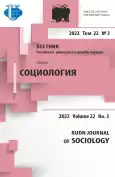Полицейское государство как симптом: немецкая классическая философия и биополитика модерна (Гегель vs Фихте)
- Авторы: Кильдюшов О.В.1
-
Учреждения:
- Национальный исследовательский университет «Высшая школа экономики»
- Выпуск: Том 22, № 3 (2022)
- Страницы: 503-517
- Раздел: Вопросы истории, теории и методологии
- URL: https://journal-vniispk.ru/2313-2272/article/view/323069
- DOI: https://doi.org/10.22363/2313-2272-2022-22-3-503-517
- ID: 323069
Цитировать
Полный текст
Аннотация
Статья посвящена малоизвестному сюжету в истории социальной мысли, получившему новое звучание в период пандемии, - дискуссии видных представителей немецкой классической философии относительно объемов понятия «полиция» как раннемодерной формы биополитического контроля. Во вводной части статьи утверждается, что критика полицейской науки и практики классиками немецкого идеализма стала парадигматической для проблематизации в рамках самосознания гражданского общества модерна новых-старых функций и возможностей санитарно-полицейского государства. В первом разделе показано напряжение между философией Просвещения и «полицейской наукой», сложившейся в рамках камералистской традиции XVII-XVIII веков, и отмечен значительный интеллектуальный вклад просветителей, прежде всего учения о праве И. Канта, в радикальные инновации политической семантики на рубеже XVIII-XIX веков, послужившие философским основанием для установления правового государства и вытеснения дискурса полицейской заботы абсолютистской власти о благе подданных. Во второй части статьи представлена краткая реконструкция попыток И.Г. Фихте на излете полицейской науки XVIII века - после эксплицитной кантовской критики не санкционированной снизу опеки государства - совместить старые идеи камералистики с новыми модерными принципами индивидуальной свободы. Третий раздел статьи посвящен критике Г.В.Ф. Гегеля, часто воспринимавшегося в истории политической мысли в качества апологета авторитарного прусского государства, - нереалистичности полицейско-научных представлений о возможности тотального биополитического контроля над социальной и экономической активностью свободных индивидов модерного типа. Реконструируется гегелевский аргумент об абсурдности идеи всеохватывающего санитарно-полицейского регулирования в духе Фихте. Делается вывод о релевантности обращения к данным фигурам, понятиям и проблемному полю - для нового прочтения истории провала раннемодерной биополитической утопии в свете актуальных сюжетов на стыке карантина и суверенитета.
Об авторах
Олег Васильевич Кильдюшов
Национальный исследовательский университет «Высшая школа экономики»
Автор, ответственный за переписку.
Email: kildyushov@mail.ru
научный сотрудник Центра фундаментальной социологии
ул. Мясницкая, 20, Москва, 101000, РоссияСписок литературы
- Vindelband V. Ot Kanta k Nietzsche [From Kant to Nietzsche]. Moscow; 1998. (In Russ.).
- Gaidenko P.P. Filosofiya Fichte i sovremennost [Philosophy of Fichte and Modernity]. Moscow; 1979. (In Russ.).
- Hegel G.W.F. Konstitutsiya Germanii [The Constitution of Germany]. Hegel G.W.F. Political Works. Moscow; 1978. (In Russ.).
- Hegel G.W.F. Iz “Konfidentsialnyh pisem o prezhnem gosudarstvenno-pravovom otnoshenii zemli Vaadta (Vo) k gorodu Bernu” [From “Confidential letters about the former state-legal relationship of the land of Waadt (Vo) to the city of Bern”]. Hegel G.W.F. Political Works. Moscow; 1978. (In Russ.).
- Hegel G.W.F. Razlichie sistem filosofii Fichte i Schellinga (prodolzhenie) [The difference between the systems of philosophy of Fichte and Schelling (continued)]. Kant Collection. Issue 14. Kaliningrad; 1989. (In Russ.).
- Hegel G.W.F. Filosofiya prava [Philosophy of Law]. Moscow; 1990. (In Russ.).
- Zhizhek S. Hegel i politsejskoe gosudarstvo [Hegel and the police State]. URL: https://syg. ma/@lacanalia/slavoi-zhizhiek-gieghiel-i-politsieiskoie-ghosudarstvo-otryvok-iz-knighigieghiel-v-podkliuchiennom-mozghie. (In Russ.).
- Zellin F. Politika [Politics]. Dictionary of Basic Historical Concepts: in 2 vols. Vol. 1. Moscow; 2014. (In Russ.).
- Kant I. Metafizika nravov [Metaphysics of morals]. Kant I. Collected Works: in 8 vols. Vol. 6. Moscow; 1994. (In Russ.).
- Kildyushov O.V. Politsiya kak nauka i politika: o rozhdenii sovremennogo poryadka iz filosofii i politsejskoj praktiki [Police as science and politics: on the birth of modern order from philosophy and police practice]. Russian Sociological Review. 2013; 12 (3). (In Russ.).
- Kildyushov O.V. Michel Foucault kak issledovatel “politsejskogo gosudarstva”: programma, evristicheskie problemy, perspektivy izucheniya [Michel Foucault as a researcher of the “police state”: Program, heuristic problems, prospects for studying]. Russian Sociological Review. 2014; 13 (3). (In Russ.).
- Filippov A.F. Epidemiya: pervye sotsiologicheskie posledstviya i perspektivy [Epidemic: First sociological consequences and prospects]. Russia in Global Politics. 2020; 3. (In Russ.).
- Fichte I.G. Zamknutoe torgovoe gosudarstvo [Closed trading state]. Fichte I.G. Essays: in 2 vols. Vol. 2. Saint Petersburg; 1993. (In Russ.).
- Fichte I.G. Osnova estestvennogo prava soglasno printsipam naukoucheniya [The Basis of Natural Law According to the Principles of Science]. Moscow; 2014. (In Russ.).
- Ebel W. Der Göttinger Professor Johann Stephan Pütter aus Iserlohn (Göttinger Rechtswissenschaftliche Studien. Band 95). Göttingen; 1975.
- Foucault M. Die Politik der Gesundheit im 18. Jahrhundert. Österreichische Zeitschrift für Geschichtswissenschaften. 1996. Band 7. No. 3.
- Hennis W. Zum problem der deutschen Staatsanschauung. Hennis W. Politik als praktische Wissenschaft. Aufsätze zur politischen Theorie und Regierungslehre. München; 1968.
- Kobe Z. The interface of the universal: On Hegel’s concept of the police. Philosophy and Society. 2019; 30 (1).
- Maier H. Die ältere deutsche Staats- und Verwaltungslehre, 2. Munchen; 1980.
- Saage R. Vertragsdenken und Utipie. Studien zur politischen Theorie und zur Sozialphilosophie der frühen Neuzeit. Frankfurt am Main; 1989.
- Schnädelbach H. G.W.F. Hegel. Hamburg; 1999.
- Schlözer A.L. Allgemeines Staatsrecht und Staatsverfassungslehre. Göttingen; 1793.
- Stolleis M. Geschichte des öffentlichen Rechts in Deutschland. Bd. 1: Reichspublizistik und Policeywissenschaft 1600–1800. München; 1988.
Дополнительные файлы









